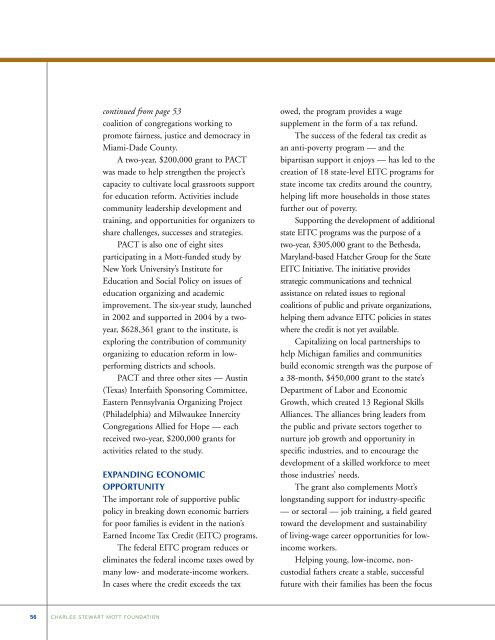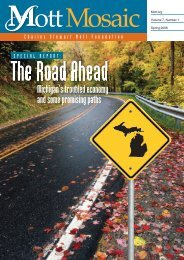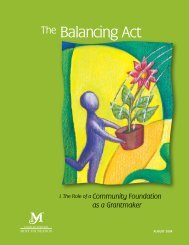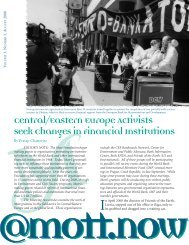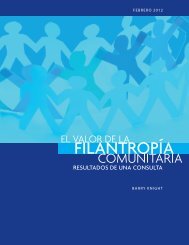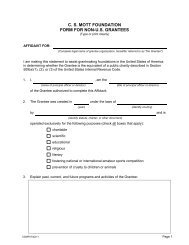Annual Report 2004 - Charles Stewart Mott Foundation
Annual Report 2004 - Charles Stewart Mott Foundation
Annual Report 2004 - Charles Stewart Mott Foundation
You also want an ePaper? Increase the reach of your titles
YUMPU automatically turns print PDFs into web optimized ePapers that Google loves.
continued from page 53<br />
coalition of congregations working to<br />
promote fairness, justice and democracy in<br />
Miami-Dade County.<br />
A two-year, $200,000 grant to PACT<br />
was made to help strengthen the project’s<br />
capacity to cultivate local grassroots support<br />
for education reform. Activities include<br />
community leadership development and<br />
training, and opportunities for organizers to<br />
share challenges, successes and strategies.<br />
PACT is also one of eight sites<br />
participating in a <strong>Mott</strong>-funded study by<br />
New York University’s Institute for<br />
Education and Social Policy on issues of<br />
education organizing and academic<br />
improvement. The six-year study, launched<br />
in 2002 and supported in <strong>2004</strong> by a twoyear,<br />
$628,361 grant to the institute, is<br />
exploring the contribution of community<br />
organizing to education reform in lowperforming<br />
districts and schools.<br />
PACT and three other sites — Austin<br />
(Texas) Interfaith Sponsoring Committee,<br />
Eastern Pennsylvania Organizing Project<br />
(Philadelphia) and Milwaukee Innercity<br />
Congregations Allied for Hope — each<br />
received two-year, $200,000 grants for<br />
activities related to the study.<br />
EXPANDING ECONOMIC<br />
OPPORTUNITY<br />
The important role of supportive public<br />
policy in breaking down economic barriers<br />
for poor families is evident in the nation’s<br />
Earned Income Tax Credit (EITC) programs.<br />
The federal EITC program reduces or<br />
eliminates the federal income taxes owed by<br />
many low- and moderate-income workers.<br />
In cases where the credit exceeds the tax<br />
owed, the program provides a wage<br />
supplement in the form of a tax refund.<br />
The success of the federal tax credit as<br />
an anti-poverty program — and the<br />
bipartisan support it enjoys — has led to the<br />
creation of 18 state-level EITC programs for<br />
state income tax credits around the country,<br />
helping lift more households in those states<br />
further out of poverty.<br />
Supporting the development of additional<br />
state EITC programs was the purpose of a<br />
two-year, $305,000 grant to the Bethesda,<br />
Maryland-based Hatcher Group for the State<br />
EITC Initiative. The initiative provides<br />
strategic communications and technical<br />
assistance on related issues to regional<br />
coalitions of public and private organizations,<br />
helping them advance EITC policies in states<br />
where the credit is not yet available.<br />
Capitalizing on local partnerships to<br />
help Michigan families and communities<br />
build economic strength was the purpose of<br />
a 38-month, $450,000 grant to the state’s<br />
Department of Labor and Economic<br />
Growth, which created 13 Regional Skills<br />
Alliances. The alliances bring leaders from<br />
the public and private sectors together to<br />
nurture job growth and opportunity in<br />
specific industries, and to encourage the<br />
development of a skilled workforce to meet<br />
those industries’ needs.<br />
The grant also complements <strong>Mott</strong>’s<br />
longstanding support for industry-specific<br />
— or sectoral — job training, a field geared<br />
toward the development and sustainability<br />
of living-wage career opportunities for lowincome<br />
workers.<br />
Helping young, low-income, noncustodial<br />
fathers create a stable, successful<br />
future with their families has been the focus<br />
56 CHARLES STEWART MOTT FOUNDATION


